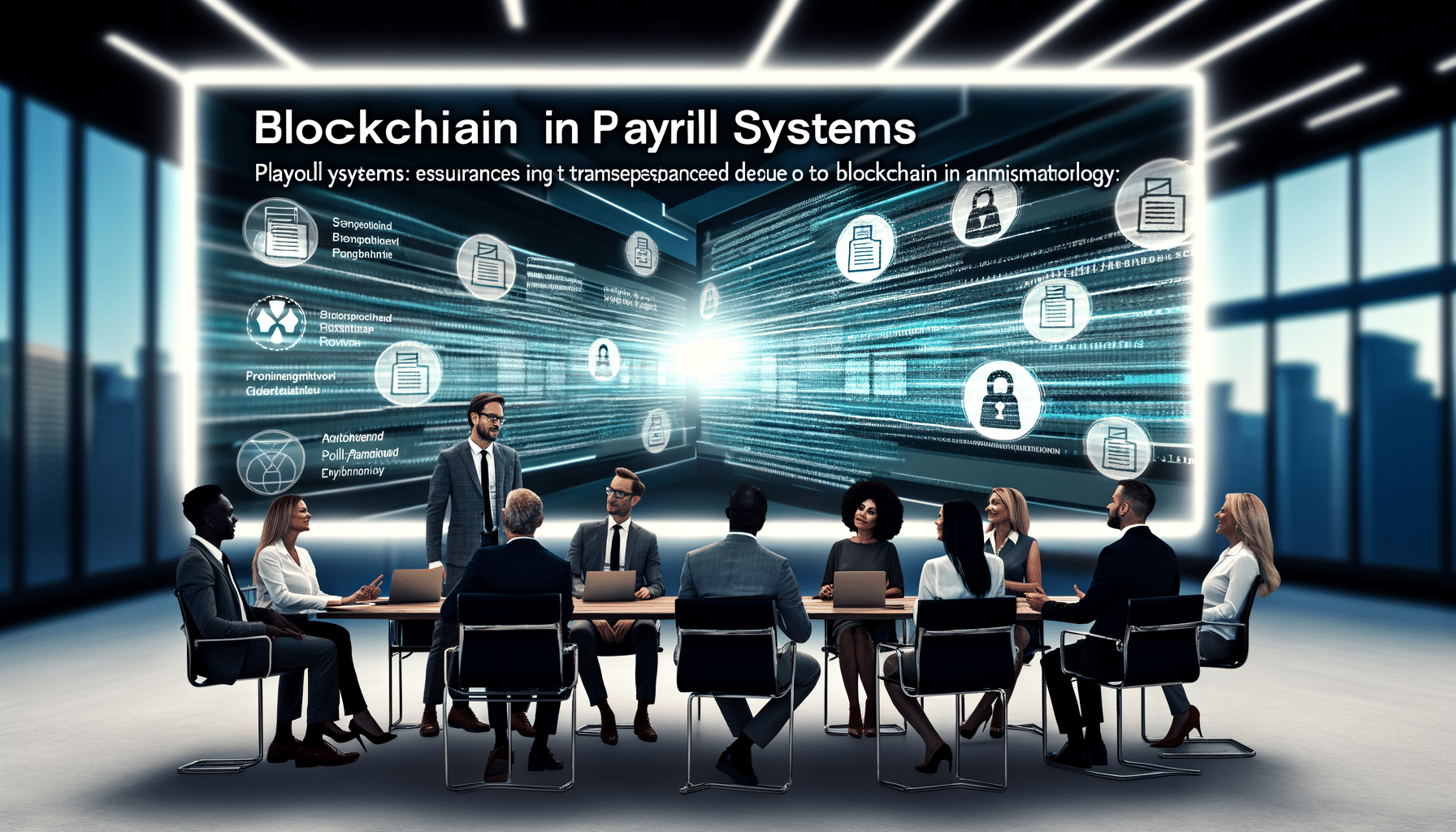- AI in Finance
- November 16, 2024
Blockchain in Payroll Systems: Ensuring Transparency

Revolutionizing Payroll with Blockchain: A New Era of Transparency
In today’s fast-paced business environment, the demand for transparent, secure, and efficient payroll systems has never been greater. As a leader in financial technology and compliance, it’s critical to explore cutting-edge solutions that can elevate our payroll systems to new heights. The answer lies in a transformative technology close to my expertise: blockchain.
Understanding Blockchain’s Role in Payroll
Blockchain technology promises to revolutionize myriad industries, from supply chain management to voting systems. However, its potential in the realm of payroll is particularly intriguing. By utilizing blockchain’s decentralized ledger, payroll management can ensure enhanced accuracy and transparency. But what does this mean for businesses?
Traditional payroll systems often involve multiple intermediaries, varying degrees of error, and susceptibility to fraud. Blockchain mitigates these challenges by providing a single, immutable record accessible to all relevant parties. This decentralized ledger ensures that each transaction is recorded in real-time, guaranteeing transparency and trust among employers, employees, and regulatory bodies.
Major Benefits of Blockchain in Payroll
- Transparency and Trust: Blockchain offers a clear audit trail for payroll transactions, reducing discrepancies and fostering confidence among stakeholders.
- Enhanced Security: The encryption and decentralized nature of blockchain protect sensitive payroll data from unauthorized access and cyber threats.
- Operational Efficiency: Automating payroll processes with smart contracts reduces manual intervention, accelerates processing times, and minimizes errors.
- Cost Savings: By cutting out intermediaries, blockchain lowers transactional costs and streamlines operations.
Implementing Blockchain in Your Payroll System
Adopting blockchain technology for payroll doesn’t have to be a daunting process. Begin by assessing your current system’s pain points and identifying where blockchain’s strengths can be best applied. Typically, organizations start by integrating blockchain for data recording and transaction validation, then gradually expand to full-scale adoption.
Daniel, the CFO of a medium-sized enterprise, shared his experience of implementing blockchain in his department’s payroll. “We faced issues with manual errors and lack of transparency in our records. Transitioning to blockchain not only eradicated these mistakes but also boosted team morale through improved payment trustworthiness.”
Overcoming Adoption Challenges
Adopting any new technology brings challenges, and blockchain is no exception. Here are a few considerations for a smooth transition:
- Stakeholder Buy-In: Educate and engage key decision-makers early in the process to ensure alignment and support.
- Data Privacy Compliance: Utilize blockchain in a way that conforms to existing data protection regulations such as GDPR and HIPAA.
- Training and Onboarding: Equip your team with the necessary skills to operate within a blockchain-enabled payroll environment.
- System Integration: Work with blockchain experts to integrate this technology with your current payroll software solutions smoothly.
A Look into the Future: Blockchain and Payroll Innovation
The trajectory of blockchain in payroll is one of exciting potential growth. As technology advances, we can anticipate further innovations that enhance payroll’s efficiency, transparency, and accuracy. Moreover, integrating additional elements such as AI can help predict and address payroll discrepancies even before they occur.
The key takeaway is to remain adaptable and forward-thinking, looking for opportunities to innovate and improve processes continually. Blockchain’s impact on payroll is just beginning to unfold, and by embracing these changes, businesses position themselves competitively in a digitally evolving landscape.
Conclusion
Embracing blockchain technology in payroll management is more than a mere upgrade; it’s a strategic move towards achieving unparalleled transparency and operational efficiency. I invite you to explore this fascinating intersection of finance and technology further, and to follow my journey with RecordsKeeper.AI as we continue to provide groundbreaking solutions built on blockchain and AI. This is only the beginning!
Curious to learn more about blockchain’s transformative potential in finance? Join me as we navigate these exciting changes and redefine how businesses understand and manage their payroll systems.
Toshendra Sharma is the visionary founder and CEO of RecordsKeeper.AI, spearheading the fusion of AI and blockchain to redefine enterprise record management. With a groundbreaking approach to solving complex business challenges, Toshendra combines deep expertise in blockchain and artificial intelligence with an acute understanding of enterprise compliance and security needs.
Related Posts

Handling Rush Financial Report Requests
Managing urgent requests for financial documentation.
- December 20, 2024

Seasonal Record Management for Tax Firms
Organizing records during peak tax season efficiently.
- November 24, 2024
Archives
- December 2024
- November 2024
- October 2024
- September 2024
- August 2024
- July 2024
- June 2024
- May 2024
- April 2024
- March 2024
- February 2024
- January 2024
- December 2023
- November 2023
- October 2023
- September 2023
- August 2023
- July 2023
- June 2023
- May 2023
- April 2023
- March 2023
- February 2023
- January 2023
- December 2022
- November 2022
- October 2022
- September 2022
- March 2019
Want to get more content like this?
Signup to directly get this type of content to your inbox!!
Latest Post
Organizing External Auditor Access
- December 22, 2024
Document Control in Manufacturing Plants
- December 21, 2024
Handling Rush Financial Report Requests
- December 20, 2024
Managing Record Access After Staff Changes
- December 19, 2024





